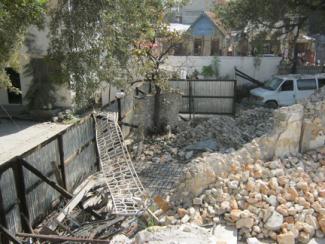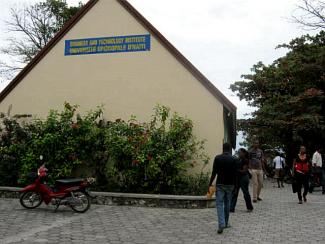By The Rev. Lise Hildebrandt
I recently spent three weeks in Haiti where I taught a seminar on public health at the Bishop Tharp Business and Technical Institute (BTI) in Les Cayes, and in return received an education about the country and the Episcopal Diocese of Haiti.
The stories you have heard about Haiti are true: the unbelievable poverty (a woman collecting water from a mud puddle in a mountain road, a boy beggar sniffing a gasoline-soaked rag for escape); the devastation from the earthquake (the Episcopal cathedral and school in ruins, collapsed buildings unchanged from last January, tent cities everywhere, tents and shacks and tarps crammed against one another in subhuman conditions); the obvious lack of infrastructure and overwhelming environmental destruction (unspeakably horrible roads, nude deforested mountains, silted farmland, endless piles of trash and excrement, acrid smoke from burning plastic); the rampant disease (AIDS, cholera, malaria); the unstable political situation (election shenanigans, riots, the bizarre return of “Baby Doc” Duvalier).
I studied more than current disasters, though. While there, I talked to Haitians, read the book Mountains beyond Mountains by Tracy Kidder and devoured the fall 2010 issue of the magazine Reflections from Yale Divinity School titled: “No More Excuses: Confronting Poverty.” What I learned was that Haiti has been economically hamstrung since its independence in 1804, when France demanded at gunpoint an enormous sum (more than $20 billion in today’s dollars) as compensation for its loss of the country. Servicing that debt and the loans borrowed to pay for it sucked the country dry of any money that could have gone to build roads, schools and hospitals, or sustain economic development.
Our country’s complicity in Haiti’s poverty is galling: refusing to trade with the new country for 60 years, fearing slave revolts in the U.S.; making loans to Haiti with outrageous conditions; invading Haiti in 1915 and ruling with brutal military might for 19 years; backing the terrible Duvalier dictators because they were seen as “foes of Communism.” The present horror in Haiti is a sharp indictment of us, the blan (whites, non-Haitians, those in power) and the poverty we have inflicted on these, our brothers and sisters.
My education was not without hope. The country is intensely religious, with Christian sayings worked into business names seen in signs on tap-tap cabs: “Jehovah Jireh Auto Parts,” “God Provides” grocery store and, my personal favorites, “Eternal Father” and “Son of God” lotto banks. What I heard over and over again was that the future of Haiti lies in education and economic development. What I saw was that the church (in all its varieties), and the Episcopal Church especially, is committed to these very things. The Diocese of Haiti, the largest in the Episcopal Church, has more than 100,000 communicants but just more than 40 priests. Every priest oversees from three to 12 parishes, missions or preaching stations, and many of the diocese’s 254 schools. The Episcopal University of Haiti includes a main campus, seminary, nursing school and BTI, and is filled to capacity.
BTI is a particularly bright spot. Started in 2005 through a partnership with Episcopal Relief and Development, BTI currently serves 350 students, who learn French and English and study for two or four-year degrees in business management or computer technology services. The students are motivated, ambitious and eager to learn at this well-run, attractive campus that is open seven days a week and has electrical power at all times (unlike most of the city). It provides education to students around Les Cayes, skilled workers to city businesses and support for budding entrepreneurs. It is capably directed by Pere (Father) Kesner Ajax, BTI’s tireless, energetic and upbeat advocate. Pere Ajax is also the director of the Episcopal Partnership Program, which pairs American congregations with Haitian congregations or missions.
At the diocesan Synode (convention), which was held in Canges, I heard the conviction of Bishop Jean Zache Duracin vowing to rebuild not only the churches and schools which were damaged or destroyed in the earthquake, but to rebuild the country. This would happen in partnership with the wider Episcopal Church and also partner congregations. But it would mean economic development, not just a dependent mentality. Haiti’s churches, schools and businesses must be able to live sustainably and be supported internally—long-term goals, not a short-term fix. This sentiment was echoed by Pere Ajax, other priests and even an economic developer I met on the plane.
We have, I believe, not only a moral obligation to right centuries of wrong and to eradicate poverty in Haiti; we also have a great opportunity to grow in humility and faith. It’s important for our wholeness to work alongside our brothers and sisters, not as the great benefactors who know it all, but as people who have to look suffering in the eye, acknowledge our complicity in it and learn from the experience and faith of those who live there. It’s important for us to feel powerless and frustrated, and yet invite the Holy Spirit in to guide us together to use our power and resources to build a just and sustainable society, both in Haiti and in our home communities. Education is useless if it does not transform; we need to be educated and transformed even as we need to support the education and transformation of Haiti.
So get involved. Monetary donations and guest lecturers are welcome at BTI—come for a semester or a week. Ask about becoming a partner church. I guarantee you will be educated and transformed. For more information, contact the Rev. Kesner Ajax at kesnerajax@yahoo.com or Angela Galbreath, assistant for Episcopal Partnerships, at angelagalbreath@gmail.com.
The Rev. Lise Hildebrandt served most recently as the interim rector at the Church of the Good Shepherd in Wareham.
Opinions expressed in “Perspectives” are the writers’ own.


